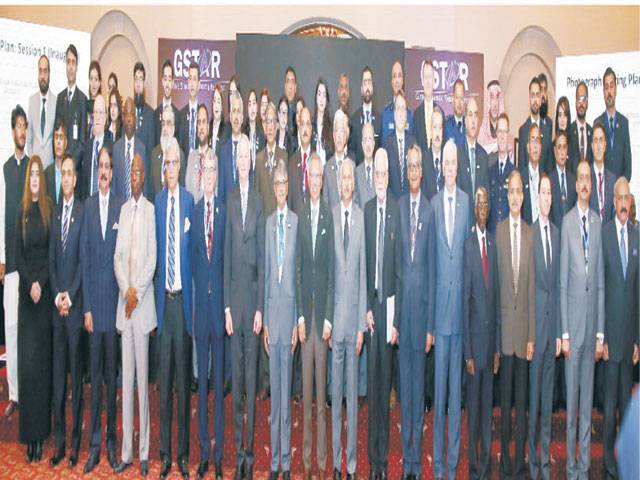ISLAMABAD-President Dr. Arif Alvi on Wednesday said that despite belligerence of India, Pakistan has always made continuous efforts for peace in the region.
Addressing an international conference on Global Strategic Threat and Response here, the President said Pakistan understands the value of peace and rejecting the war.
He said Prime Minister Imran Khan in his first speech talked about peace with India. He said as a peace overture, Pakistan also returned the Indian pilot after shooting down their aircraft.
The President noted that it was because of the threat of war from the neighbouring country that we started work on the track of nuclear weapons to secure ourselves.
He referred to the perilous situation in the Indian Occupied Jammu and Kashmir and the latest attacks against Muslims and carnage in India to make his point. The President expressed disappointment that other countries have not taken much notice of the situation out of their own vested interests. He reminded that it is the same Modi who was denied the US visa.
Alvi said peace is elusive in the world and it cannot be achieved through wars. He said wars have always been used for exploitation and plunder but the humanity is not learning from these bad experiences. He lamented that new instruments are now being developed and introduced to wage wars.
He regretted that the Muslim world had also suffered due to the interests of others.
With wars, peace could not be achieved, neither such spectacles could contribute towards the rebuilding of nations, he added.
The president said the world had been confronted with latest challenges like xenophobia and Islamophobia. Along with such issues, poverty, education, health, pollution and social disparity were the other common challenges, faced by the world community, he added.
The president said the technological revolutions in the modern warfare also brought complexities as with slight error, the world could be plunged into disaster as evident during Cuba crises.
The president said it was an era of cyber and hybrid wars and the technological revolution. Human DNA took thousands of years to change but the artificial intelligence could take hours to develop such software, he added. About the impacts of social media, the president said that now these tools were used to affect minds of the people which could be another type of warfare.
The president also shared his concerns over the ‘new destructive economic order,’ quoting certain renowned authors and scholars.
He observed that the western interests were swaying the global bodies in which morality and justice often found no place.
Chief of Air Staff, Air Chief Marshal Mujahid Anwar Khan, renowned defence analysts, experts, diplomats and academics attended the event. Speaking on the occasion, President of Centre for Aerospace and Security Studies (CASS) Air Chief Marshal (retired) Kaleem Saadat said that the CASS had been a new think-tank in the twin cities which studied the global transformative and destabilising transitions in the global order.
He said the world had been passing through the best and worst of times due to the enormous challenges from cyber tech to aerospace, security and environmental degradation, global tyranny of the rich and inequality of life.
The former air chief also called upon the international community to take notice of the coercive and sham democracy in India which was also posing threat to the world.
Cameron Munter, former US ambassador to Pakistan said that Pakistan’s issues like economy and climate change would be the key factors to face the emerging new global order. He said the old world had been fading, but the new world had not yet shaped itself. Former ambassador and foreign minister Inam ul Haq and former foreign secretary Jalil Abbas Jilani also spoke on the occasion.
Munter noted that climate change, technological challenges including biological inventions and governance system would be the main three problems, faced by the world community in the new world order.
Lauding Pakistan’s role in the Afghan peace and reconciliation process, he said Pakistan could further show its diplomatic strength by further bringing together Saudi Arabia and Iran. Pakistan could further play a major role on key issues in the region, he added.
They said Pakistan being at the centre of different changes taking place around the world, could serve as bridge among various countries.
They added that Pakistan had always played a leading role in the regional peace as evident in Afghanistan and in the aftermath of August 5 unilateral and illegal steps of the Indian government over the IOJ&K.






